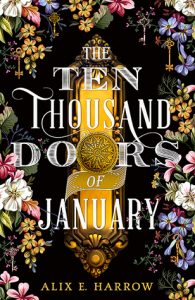THE TEN THOUSAND DOORS OF JANUARY by Alix E. Harrow (Book Review)
‘Worlds were never meant to be prisons, locked and suffocating and safe. Worlds were supposed to be great rambling houses with all the windows thrown open and the wind and summer rain rushing through them, with magic passages in their closets and secret treasure chests in their attics.’
The Ten Thousand Doors of January is the debut novel by Alix E. Harrow, and let me tell you right now, folks, it’s an absolutely stunning one! I devoured every single page and revelled in this immersive tale.
I have to start off by saying a huge thank you to the publisher Orbit, especially to Maddy Hall, Nazia, and Emily Byron, for designing and sending me (and many other reviewers) such an awesome proof copy. I really loved discovering all the surprises that were included at the beginning of various chapters, such as fabric leaves, pressed flowers, and our very own key. This copy was as magical as the story itself.
 I’ll move on now to what the book is about, but as always I’ll try to keep this brief, because who doesn’t love just discovering the plot for themselves? The story begins with the introduction of a young biracial girl called January. We learn that although her father is alive, he is mostly absent as he was regularly sent on rare artefact-finding missions by his benefactor, Mr Locke. It is this man who cares for January in her father’s absence, and tries to civilise her wild whimsical ways. However, one day January finds a mysterious door, one that leads to an unknown place; and when she subsequently finds a cryptic book, her longing for adventure and freedom takes her to extraordinary heights, ones that just sweep the reader away.
I’ll move on now to what the book is about, but as always I’ll try to keep this brief, because who doesn’t love just discovering the plot for themselves? The story begins with the introduction of a young biracial girl called January. We learn that although her father is alive, he is mostly absent as he was regularly sent on rare artefact-finding missions by his benefactor, Mr Locke. It is this man who cares for January in her father’s absence, and tries to civilise her wild whimsical ways. However, one day January finds a mysterious door, one that leads to an unknown place; and when she subsequently finds a cryptic book, her longing for adventure and freedom takes her to extraordinary heights, ones that just sweep the reader away.
The book is set in the 1900s; a time where wealthy men prevailed; a time where any person with dark skin was deemed as savage, lesser; this was a time where oppression reigned. For our young female protagonist it is a dangerous time indeed. January is fully aware that she is an ‘in-between creature’, as she often calls herself, because of her mixed race and skin complexion; she quickly realises that anything less than her utmost obedience would be dangerous. Harrow poignantly reflects through January what it must have been like to grow up in an environment where you are made to feel so alienated and belittled. For instance, we often see January treated like an exhibition, as her carer, Mr Locke, parades her around at his social gatherings as though she is merely another rare collectible item he has acquired. The way she is treated here certainly evoked a lot of emotion in me.
‘“You people are always trying to invent reasons for things. Monsters only come for bad children, for loose women for impious men. The truth is that the powerful come for the weak, wherever and whenever they like. Always have, always will.”’
From the very outset, I found this novel to be reminiscent of the classic book A Little Princess by Frances Hodgson Burnett, which is one of my favourites! January reminded me very much of Sara Crewe from A Little Princess, who is also lonely and made to feel like an outcast. January has a wild imagination; she is often impulsive, flighty, and simply yearns to be off on an expedition with her father. She spends a lot of time alone, and the only place she finds solace is in her books.
I feel that Harrow executed January’s character really well. Realistically, she does not rebel against her benefactor to begin with; she longs to please him, to have his approval and to just be his ‘good girl’, because she believes he loves her. However, as events spiral, she soon reaches the point where enough is enough. Through the power of the tales she reads, the protagonists she admires, and through finding the strange book that resonates so much with her own life, gives her the courage to bring about change.
I feel here is where The Ten Thousand Doors of January really excels. Through Harrow’s beautiful, eloquent and almost lyrical prose, we read about a world where stories are so much more than sheer entertainment: they are alive and jump from the page. Harrow throws us into a whimsical narrative where stories have the power to quell loneliness, every word has the power to shape the world, and those words can also touch a person so deeply that it becomes their place to escape into. This is such a great concept for any reader to experience, and firmly cements this book as a fantastic read for all book lovers because, truthfully, who hasn’t used books for escapism?
I would definitely state that this is not a fast-paced novel, and it is not full of gory action scenes. Honestly though, reading Harrow’s prose is such a joy that in my opinion, it doesn’t need to be. Instead we meander through January’s life from childhood as she recounts her journey from the age of seven into the cusp of her adolescence. We see her experience loss, betrayal, and eventually love through her first person narration. We also meet several other characters along the way, such as a companion dog named Bad, and a nanny, Jane; and as this book is a story within a story, we also wander through the lives of Ade and Yule, who are two young lovers from January’s mysterious book. Now, if you’ve known me a while, you know I don’t really enjoy romance in books, but here me now folks, I adored it in this! It was just so beautifully heartbreaking that I was completely absorbed by their tale.
‘Through the underwater heat of the humid afternoons and into the relief of the cool nights, they told one another twelve years of stories. Ade told her story first, and it was a thrilling confabulation of starlit train rides and foot-worn journeys, of leaving and coming, of doors standing slantwise in the dusk, half open. Yule found he couldn’t listen to her without a pen in his hand, as if she were archival scroll sprung to life, which he had to document before she vanished.’
I have to also mention how much I loved Jane. In fact, whilst reading I was slightly disappointed that we didn’t get more of a detailed account of her backstory and where she came from, because she had such an interesting history. In hindsight though, this is actually a good thing, because now Harrow has left the perfect gateway to revisit this magical world and perhaps write many more stories there.
Lastly, another aspect I loved was the way the book crosses genres, much like the main story crosses many worlds. It is part historical fiction, part fantasy, and part coming of age. The Ten Thousand Doors of January is a celebration of books; it is a reflection of the power of stories, of words, and it is, honestly, a remarkable read to escape into.
ARC provided by Orbit in exchange for an honest review. All quotes used are taken from the ARC, and are subject to change upon publication.
The Ten Thousand Doors of January is due for release 12th September 2019. You can pre-order it here.

Image courtesy of @nils.reviewsit (Instagram)
